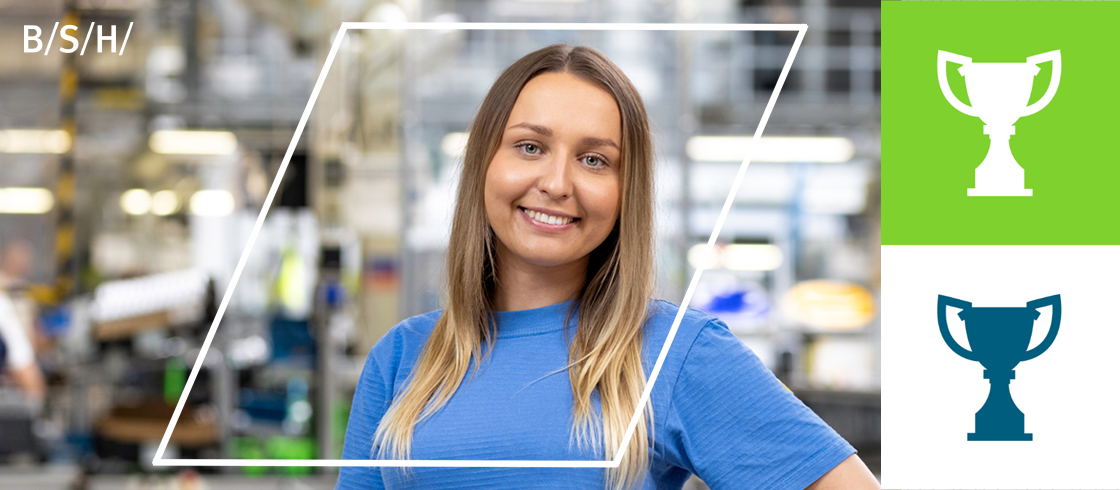Alina Budianska: Fostering cultural inclusiveness in a factory
Reading time: 4 minutes
Our Diversity Champion Alina Budianska knows what it is like to come to a new country without speaking its language or knowing its culture: She moved from her home in Ukraine to Poland and started to work as a production worker at BSH’s dryer factory in Łódź in 2017. Being an ambitious person, Alina spent her free time learning Polish on a company-sponsored course and was promoted to TPM Leader. Due to her engagement with new employees from diverse cultural backgrounds, Alina’s colleagues see her as a great inspiration and role model, which is why they nominated her as one of BSH’s Diversity Champions. Find out more about her new role and how she actively fosters Diversity, Equity and Inclusion (short: DEI) in her daily work by watching the interview.
Can you please briefly explain what a TPM Leader is and what is involved?
I have been working as a TPM Leader at BSH’s dryer factory in Lodz, Poland, for three years now. TPM is a system that engages employees at all levels in the efficiency and safety of equipment, with the aim of having no breakdowns, stops or slowdowns. My position requires manufacturing knowledge, but leadership skills are also essential. My main task is to introduce new employees to direct production positions. I take care of them during their first days of work. As part of the crisis team, I also helped organizing transportation from the Ukrainian border and temporary accommodations for BSH colleagues and their relatives seeking refuge in Poland. Since I have been living in Poland for several years, I know the Polish culture and Ukrainian culture very well and I’m able to find a great balance in this. In this respect, I act as a role model for many employees from different countries who are eager to learn this, too.
How do you feel about being nominated as Diversity Champion and what does the nomination mean to you?
I am very pleasantly surprised to be nominated as a Diversity Champion, as I don't think my behavior differs much from that of other BSH employees. My first position at BSH was as a production support worker - at that time I still couldn't speak or write Polish properly. Fortunately, I ended up in a team where everyone understood my situation and helped me as much as they could: the coordinator tried to have me trained by a person who could explain to me in my language what to do. My Polish colleagues tried to communicate with me, taught me new words, corrected me if I said something wrong. I felt like one of them despite the fact that I am a completely different nationality. The people I worked with on a daily basis built the openness and courage in me to apply for the position of TPM Leader. In fact, I was chosen directly by my supervisor to take part in the recruitment. I was the first woman hired for this position at the dryer factory. I still remember beginning in this position with a smile, and I will always be grateful to my colleagues for their support and help. Thanks to the people I work with, work for me is not a necessity but a place I come to with pleasure – and I want everyone to feel that way.
As a TPM Leader, you are actively working on integrating Ukrainian employees into the Łódź factory . How do you try to make integration easier and why do you think it is important?
My story is no exception - I know a lot of stories where employees from other countries have had a great deal of help and support at the beginning of their careers at BSH. This is evidenced by the large number of employees, 600 and counting, from Ukraine (but also other countries) who have been working at BSH for many years, and the fact that they are employees at all levels. In my role people can also come to me and tell me about a problem, not only professionally, but privately. Often people who start their careers at BSH have huge communication problems. Due to the fact that I know their culture well and the challenges they are facing, they show me a huge amount of trust, which I am extremely happy about. I try to be helpful and open to them, so that they feel an important and needed member of the team from day one.
What do the benefits of DEI look like in your case?
I have never felt discriminated against in the workplace because of my nationality. I can’t stress enough that the whole of BSH’s DEI policy is aimed at making sure there is no discrimination. It's not just about ethnicity, but also gender, sexual orientation, and skin color. We have anonymous surveys from time to time where we can report anything that concerns us. We get feedback after them, so we know that our voices are heard. Every quarter there is a team meeting where we can discuss any problems together with our supervisor and take action on them. All in all, the company does everything so that our time at work is spent with pleasure, in a calm atmosphere and without any sense of discrimination. I believe that everyone regardless of their views, gender, background or any other characteristics can feel at home with us.




